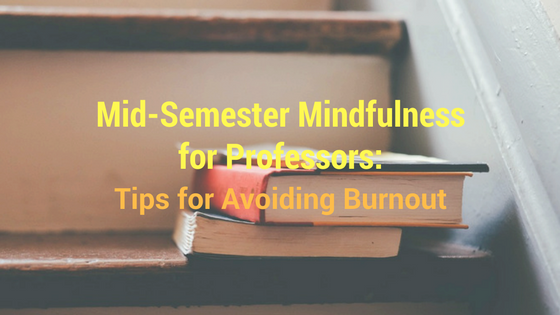
As many colleges approach the middle of their semesters, it is quite likely that you have come to face some level of burnout- the physical and mental exhaustion that comes from a snowballing of stress, overworking yourself, overexertion, and so on.In this state, you may find yourself eagerly glancing, bleary-eyed, at your academic calendars, wondering: “Now, just how many days are actually left until break?”
Fortunately, at this point of the semester, it can be uplifting to re-center yourself-and rather simple-by working towards mindfulness. Author of Mindfulness Burnout Prevention: An 8-Week Course for Professionals, Christopher Dines, defines mindfulness as: “Deliberately focusing our attention on our thoughts, emotions, feelings, sensations and mental activity without losing awareness of what is happening in the present moment. It is essentially being in a state of present-moment awareness and maintaining clarity without being swayed or distracted by mental commentary.” Part of maintaining a healthy emotional and mental balance will require a conscious shift towards mindfulness in the minute parts of your day, as well as in purposeful refocusing activities.
Listed below are some self-care strategies to avoid and remove yourself from a state of burnout:
Simply take a moment to breathe. “We rush (often while shouting into a mobile phone), completely missing the enjoyment of walking. Walking and breathing, if practiced harmoniously, can be peaceful and thoroughly enjoyable. Even walking down a corridor or into an office or wherever we are working or being of service can be a harmonious action” (Dines, Mindfulness Burnout Prevention).
Limit the amount of work that you bring home. It always seems like one stack of papers is replaced by another with such cyclical repetition that you are doomed to mull over papers 24 hours a day. Unless there are hard deadlines for grading, do not force late nights on yourself. Rather, level with your students and be honest: as students, they are likely sympathetic to late nights and burnouts themselves.
Set limitations on when you check your emails. While it is recommended to establish this policy earlier on in the year, it is never too late to write “you” time into your schedule. Let your students know that you are not likely to get back to them after 8 PM or so (or any time that you purposefully give yourself to decompress).
Take the time to learn something interesting and new. One professor I have spoken with decided to take up cross-stitching-to which she abashedly admitted she was terrible at doing. However, the activity demanded her full attention. As they say, “Busy hands keep the mind from wandering.”
Keep up with the bare necessities: eat, sleep, and exercise.
Many of these ideas for escaping burnout may appear self-evident, but when we find ourselves in these situations where the work can seem never-ending and unappreciated, the simplest habits are some of the first to be neglected. Remember to challenge yourself to be mindful in the quiet moments, monitor yourself in keeping up with healthful habits, and unapologetically use your time to pursue engaging activities for yourself.

